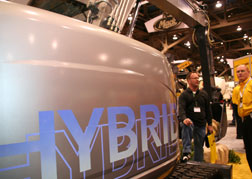Earthmoving machines may soon get a boost of diesel-electric hybrid power, as heavy-equipment producers mirror automakers' efforts to attack problems that rising oil consumption poses to inflation, energy security and the environment.
 Concept machine makes North American debut.
|
New Holland, a division of Lake Forest, Ill.-based CNH Global N.V., may be the first vendor out of the chute with the "HE-01," a 7-ton hydraulic excavator powered by 2.2L diesel engine and a 37-kW electric motor.
So far, the company has produced four prototypes, using this year's World of Concrete show to put the spotlight on hybrid construction machines for the first time in North America since mining equipment vendors began putting diesel-electric drives on giant earthmovers in the late 1950s.
CNH officials hope to gauge interest while designers evaluate the machines' performance. "We are not ready tomorrow, but we are the only one with working prototypes," said Franco Fenoglio, president of New Holland, at a press conference Jan. 23 in Las Vegas. It first unveiled the concept machine last year at the Intermat show in Paris.
It may take several years before they go on sale, but some units already have hit the dirt. New Holland's development partner, Kobelco Construction Machinery Co. Ltd., is running two prototypes on construction sites near its headquarters in Japan. The machines have racked up more than 1,000 hours and may end field trials later this spring, according to Kobelco officials.
 Fenoglio
|
Engineers then plan to look at the results and determine whether mass production is feasible, said Masayuki Komiyama, manager of Kobelco's hybrid design group. Price also is up in the air, he said.
If they work, diesel-electric hybrids could boost fuel economy by 40% and cut carbon pollution in equal amounts, Fenoglio noted. That would make the excavator a boon for contractors and public fleet owners working in urban areas and highly-regulated places, such as California.
Scientists have continually criticized diesel engines for emitting large amounts of carbon dioxide and other toxic pollutants. Hybrid vehicles, combined with biofuels, would lessen the environmental impacts, they say.
HE-01 has a clean-diesel engine powering an electric generator, which stores energy in a 300-volt lithium-ion battery pack. It helps run the vehicle's hydraulic pumps, which are mated to boom cylinders above the cab and rubber tracks below.
|
Also tied to the generator is an electric swing drive, which uses regenerative braking to put energy back into the batteries as the cab swivels from side to side. Two 24-volt batteries start the crankshaft and power the cab functions. The engine charges those batteries directly, as usual.
The engine doesn't shut off like a typical hybrid; however, it runs at a constant speed of 2,200 rpm, regardless of external loads. That saves fuel and cuts its size by 50%, Kobelco designers said. The vehicle's overall weight remains unchanged. Larger vehicles are a target for hybridization in the future, as well.
It is too early to say how much money companies will be willing to spend on hybrid machinery, Fenoglio said, but added that equipment producers need to start addressing the global warming issue today.
Otherwise, he said, "There is no tomorrow."
 Related Links:
Related Links: 
Post a comment to this article
Report Abusive Comment